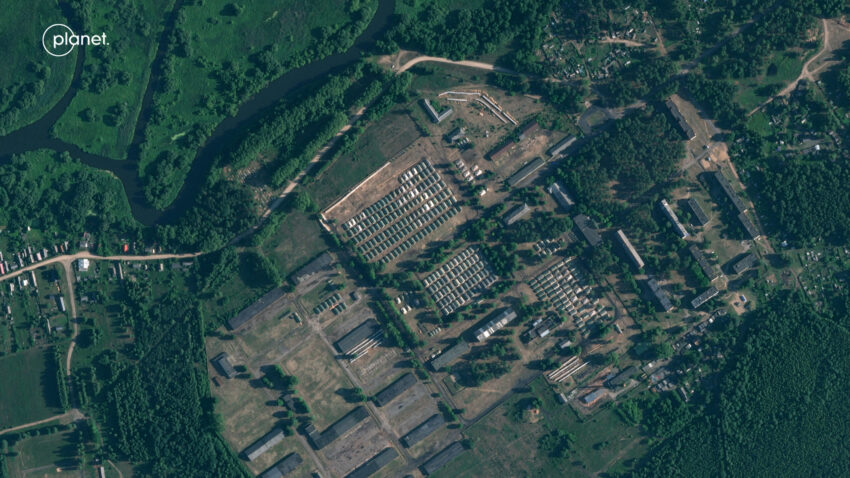Planet’s satellites capture a military field camp taking shape in Belarus, which analysts say housed the Wagner Group. The camp has since been dismantled following Wagner Group leader, Prigozhin’s, death. (Image courtesy of Planet Labs PBC.)
WASHINGTON — Planet Labs, a satellite imagery and data company, announced it was awarded a seven-figure contract to deliver artificial intelligence/machine learning-enhanced surveillance capabilities for NATO’s “strategic areas of interest.”
Planet will supply NATO with “a specialized platform solution” that leverages its PlanetScope Broad Area Monitoring suite — a slew of capabilities that utilize high-resolution daily satellite monitoring and other data and analytic tools to detect any changes over a location — paired with its “new” AI and ML capabilities, according to a Thursday announcement from the company. This new capability will be used for both space surveillance and maritime domain awareness functions, the company said.
“This landmark partnership comes at a time of significant global change, where nations, particularly in Europe, are rapidly enhancing their defense capabilities to address evolving geopolitical dynamics,” the announcement read.
The company said it will work with “partner capabilities” to mark this “transformational leap,” moving away from reactive target-centric surveillance to proactive anomaly detection, which the announcement said is in alignment with NATO’s current indications and warnings capabilities.
“Our partnership with Planet, harnessing their Broad Area Monitoring technology combined with AI and ML analytics, is a significant stride for NATO. It grants us persistent space-based surveillance, bolstering our enhanced early Indicators and Warnings and strengthening our Maritime Domain Awareness,” Supreme Allied Commander of Transformation at NATO Adm. Pierre Vandier said in the announcement.
“This initiative reinforces NATO’s commitment to maintaining our technological edge, ensuring strategic advantage and cost-effectiveness, and directly enhancing deterrence, strengthening collective defence, and empowering our warfighters with real-time situational awareness,” he added.
The exact dollar amount of the contract was not mentioned in the announcement. Neither Planet nor NATO responded to a request for comment by press time.
Planet’s newest deal with NATO comes after the alliance announced in May that it was committed to bolstering its intelligence gathering by particularly increasing investment in space and sea capabilities, Breaking Defense previously reported.
“We’re improving our intelligence capabilities and investments in space and at sea,” Maj. Gen. Paul Lynch, deputy assistant secretary general for intelligence on NATO’s military staff, told the annual GEOINT conference in St. Louis, Mo.
But Lynch, who serves in Britain’s Royal Marines, added that all 32 alliance members are working to establish stronger “intelligence gathering capabilities and situational awareness across all five domains” — air, land, sea, space and cyberspace.
Planet was also awarded a separate contract with NATO’s Communications and Information Agency (NCIA) last summer. The contract, which was for an undisclosed amount, was set to provide the alliance with high-resolution data for its Alliance Persistent Surveillance from Space (APSS) program — a project that aims to create a “virtual constellation” by combining national and commercial satellite networks. The goal of APSS is to better stand up NATO’s surveillance capabilities on land and at sea.
Theresa Hitchens contributed to this report.
Click this link for the original source of this article.
Author: Carley Welch
This content is courtesy of, and owned and copyrighted by, https://breakingdefense.com and its author. This content is made available by use of the public RSS feed offered by the host site and is used for educational purposes only. If you are the author or represent the host site and would like this content removed now and in the future, please contact USSANews.com using the email address in the Contact page found in the website menu.








